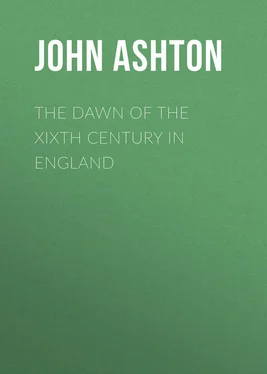John Ashton - The Dawn of the XIXth Century in England
Здесь есть возможность читать онлайн «John Ashton - The Dawn of the XIXth Century in England» — ознакомительный отрывок электронной книги совершенно бесплатно, а после прочтения отрывка купить полную версию. В некоторых случаях можно слушать аудио, скачать через торрент в формате fb2 и присутствует краткое содержание. Жанр: foreign_antique, foreign_prose, на английском языке. Описание произведения, (предисловие) а так же отзывы посетителей доступны на портале библиотеки ЛибКат.
- Название:The Dawn of the XIXth Century in England
- Автор:
- Жанр:
- Год:неизвестен
- ISBN:нет данных
- Рейтинг книги:3 / 5. Голосов: 1
-
Избранное:Добавить в избранное
- Отзывы:
-
Ваша оценка:
- 60
- 1
- 2
- 3
- 4
- 5
The Dawn of the XIXth Century in England: краткое содержание, описание и аннотация
Предлагаем к чтению аннотацию, описание, краткое содержание или предисловие (зависит от того, что написал сам автор книги «The Dawn of the XIXth Century in England»). Если вы не нашли необходимую информацию о книге — напишите в комментариях, мы постараемся отыскать её.
The Dawn of the XIXth Century in England — читать онлайн ознакомительный отрывок
Ниже представлен текст книги, разбитый по страницам. Система сохранения места последней прочитанной страницы, позволяет с удобством читать онлайн бесплатно книгу «The Dawn of the XIXth Century in England», без необходимости каждый раз заново искать на чём Вы остановились. Поставьте закладку, и сможете в любой момент перейти на страницу, на которой закончили чтение.
Интервал:
Закладка:
So the Lord Mayor invoked the aid of the Tower Ward Volunteers – who had been in readiness all day long, lying perdu in Fishmongers’ Hall – the East India House Volunteers, and part of the London Militia. The volunteers then blocked both ends of Mark Lane, Fenchurch Street, and Billiter Lane (as it was then called). In vain did the mob hoot and yell at them; they stood firm until orders were given them, and then the mob were charged and dispersed – part down Lombard Street, part down Fish Street Hill, over London Bridge, into the Borough. Then peace was once more restored, and the volunteers went unto their own homes.
True, the City was quiet; but the mob, driven into the Borough, had not yet slaked their thirst for mischief. They broke the windows, not only of a cheesemonger’s in the Borough, but of a warehouse near the church. They then went to the house of Mr. Rusby (6, Temple Place, Blackfriars Road) – a gentleman of whom we have heard before, as having been tried, and convicted, for forestalling and regrating – clamouring for him, but he had prudently escaped by the back way into a neighbour’s house. However, they burst into his house and entered the room where Mrs. Rusby was. She begged they would spare her children, and do as they pleased with the house and furniture. They assured her they would not hurt the children, but they searched the house from cellar to garret in hopes of getting the speculative Mr. Rusby, with the kindly intention of hanging him in case he was found. They then broke open some drawers, took out, and tore some papers, and took away some money, but did not injure the furniture much. In vain they tried to find out the address of Mrs. Rusby’s partner, and then, having no raison d’être for more mischief, they dispersed; after which a party of Light Horse, and some of the London Militia, came up, only to find a profound quiet. The next day the riotous population were in a ferment, but were kept in check by the militia and volunteers.
Whether by reason of fear of the rioters, or from the fact that the grain markets were really easier, wheat did fall on that eventful Monday ten and fifteen shillings a quarter; and, if the following resolutions of the Court of Aldermen are worth anything, it ought to have fallen still lower:
“A Court of Lord Mayor and Aldermen held at the Guildhall of the City of London, on Tuesday, the 16th of September, 1800.
“Resolved unanimously – That it is the opinion of this Court, from the best information it has been able to procure, that, had not the access to the Corn Market been, yesterday, impeded, and the transactions therein interrupted, a fall in the price of Wheat and Flour, much more considerable than that which actually took place, would have ensued; and this Court is further of opinion, that no means can so effectually lead to reduce the present excessive prices of the principal articles of food, as the holding out full security and indemnification to such lawful Dealers as shall bring their Corn or other commodities to market. And this Court does therefore express a determination to suppress, at once, and by force, if it shall unhappily be necessary, every attempt to impede, by acts of violence, the regular business of the markets of the Metropolis.
“Rix.”A butcher was tried and convicted at the Clerkenwell Sessions, September 16th, for “forestalling the market of Smithfield on the 6th of March last, by purchasing of Mr. Eldsworth, a salesman, two cows and an ox, on their way to the market.” His brother was also similarly convicted. The chairman postponed passing sentence, and stated that “he believed there were many persons who did not consider, that, by such a practice, they were offending against the law; but, on the contrary, imagined that, when an alteration in the law was made, by the repeal of the old statutes against forestalling, there was an end of the offence altogether. It had required the authority of a very high legal character, to declare to the public that the law was not repealed, though the statutes were.” He also intimated that whenever sentence was passed, it would be the lightest possible. Still the populace would insist on pressing these antiquated prosecutions, and an association was formed to supply funds for that purpose.
CHAPTER IV
Continuation of food riots in London – Inefficiency of Police – Riots still continue – Attempts to negotiate a Peace – A political meeting on Kennington Common – Scarcity of corn – Proclamation to restrict its consumption – Census of the people.
THE Lord Mayor in vain promulgated a pacific Proclamation; the Riots still went on.
“Whereas the peace of this City has been, within these few days, very much disturbed by numerous and tumultuous assemblies of riotous and disorderly people, the magistrates, determined to preserve the King’s peace, and the persons and property of their fellow-citizens, by every means which the law has intrusted to their hands, particularly request the peaceable and well-disposed inhabitants of this City, upon the appearance of the military, to keep themselves away from the windows; to keep all the individuals of their families, and servants, within doors; and, where such opportunities can be taken, to remain in the back rooms of their houses.
“By order of his Lordship. “W. J. Newman, Clerk .”In reading of these Riots we must not forget that the civil authorities for keeping the peace were, and had been, for more than a century previous, utterly inefficient for their purpose, and the laughing-stock of every one; added to which, there was a spirit of lawlessness abroad, among the populace, which could hardly exist nowadays. The male portion of the Royal Family were fearlessly lampooned and caricatured, and good-natured jokes were made even on such august personages as the King and Queen – the plain, homely manner of the one, and the avaricious, and somewhat shrewish temper of the other, were good-humouredly made fun of. The people gave of their lives, and their substance, to save their country from the foot of the invader; but they also showed a sturdy independence of character, undeniably good in itself, but which was sometimes apt to overpass the bounds of discretion, and degenerate into license.
So was it with these food riots. The mob had got an idea in their heads that there was a class who bought food cheap, and held it until they could sell it dear; and nothing could disabuse their minds of this, as the following will show.
On the morning of the 18th of September, not having the fear of the Lord Mayor before their eyes, the mob assembled in Chiswell Street, opposite the house of a Mr. Jones, whose windows they had demolished the previous night, and directed their attentions to a house opposite, at the corner of Grub Street, which was occupied by a Mr. Pizey, a shoemaker, a friend of the said Jones, to accommodate whom, he had allowed his cellars to be filled with barrels of salt pork. These casks were seen by the mob, and they were immediately magnified into an immense magazine of butter and cheese, forestalled from the market, locked up from use, and putrefying in the hands of unfeeling avarice. Groaning and cursing, the mob began to mutter that “it would be a d – d good thing to throw some stuff in and blow up the place.” Poor Pizey, alarmed, sent messengers to the Mansion House, and Worship Street office: a force of constables was sent, and the mob retired.
At night, however, the same riot began afresh. Meeting in Bishopsgate Street, they went on their victorious career up Sun Street, through Finsbury Square, overthrowing the constables opposed to them, down Barbican into Smithfield, Saffron Hill, Holborn, and Snow Hills, at the latter of which they broke two cheesemongers’ windows. Then they visited Fleet Market, breaking and tossing about everything moveable, smashed the windows of another cheesemonger, and then turned up Ludgate Hill, when they began breaking every lamp; thence into Cheapside, back into Newgate Street, St. Martin’s-le-Grand, and Barbican to Old Street, where they dispersed for the night. From Ludgate Hill to Barbican, only one lamp was left burning, and of that the glass was broken. Somehow, in this night’s escapade the military were ever on their track, but never near them.
Читать дальшеИнтервал:
Закладка:
Похожие книги на «The Dawn of the XIXth Century in England»
Представляем Вашему вниманию похожие книги на «The Dawn of the XIXth Century in England» списком для выбора. Мы отобрали схожую по названию и смыслу литературу в надежде предоставить читателям больше вариантов отыскать новые, интересные, ещё непрочитанные произведения.
Обсуждение, отзывы о книге «The Dawn of the XIXth Century in England» и просто собственные мнения читателей. Оставьте ваши комментарии, напишите, что Вы думаете о произведении, его смысле или главных героях. Укажите что конкретно понравилось, а что нет, и почему Вы так считаете.












